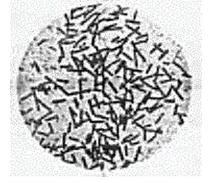Botulinum toxin is produced by a bacterium, Clostridium botulinum. It is broken into 7 types. They are botulinum toxin types A, B, C [C1, C2], D, E, F, and G. The syndrome of botulism can be seen when there is an ingestion of contaminated food, from colonization of the infant gastrointestinal tract, or from a wound infection. Human botulism is caused mainlyby types A, B, E, and rarely F. Types C and D cause toxicity only in animals.
 |
 |
Botox® is the brand name for botulinum toxin type A which is produced by the bacterium Clostridium botulinum. Botox® is the purified form of the toxin, which if taken in large amounts by mouth causes food poisoning. But when injected in small, diluted amounts into specific muscles in the body, Botox® blocks the chemical signals that cause muscles to contract. The injected muscles can no longer contract, which causes wrinkles to relax and soften and the area of the skin appears smoother and less wrinkled.
In Malaysia, Botox® can be used to treat several health problems such as:
- Neurological disorder which cause severe neck and shoulder muscle contractions
- Spastic disorder associated with injury of the center nervous system including stroke and cerebral palsy
- Frown lines between the eyebrow
- Excessive sweating
This medication is given by injection by an experienced health care professional. It is injected into the affected muscles (intramuscularly) when treating muscle spasms and wrinkles. It is injected into the skin (intradermally) for the treatment of excessive sweating.
Your dose, the number of injections, the site of injections, and how often you receive the medication will be determined by your condition and your response to therapy. Most people start to see an effect within a few days to 2 weeks, and the effect usually lasts 3 to 6 months.
The potential side effects following administration of botulinium toxins are pain when swallowing (dysphagia), difficulty in speaking (dysphonia), weakness, respiratory distress and difficulty in breathing (dyspnea). Less common side effects include anxiety, back pain, , fever, flu-like symptoms, Neck Pain, skin rash and visual changes. Side effects of botulinium toxin products have been reported as early as one day and as late as several weeks after treatment. If any of these events persist or worsen, you need to notify your doctor or pharmacist promptly.
On September 2005, a paper published in the Journal of American Academy of Dermatology reported from the FDA saying that the use of Botox® has resulted in 28 deaths between 1989 and 2003, though none were attributed to cosmetics use. On February 8, 2008, the FDA announced that Botox® has “been linked in some cases to adverse reactions, including respiratory failure and death, following treatment of a variety of conditions using a wide range of doses,” due to its ability to spread to areas distant to the site of the injection. Among the years,several cases of death have been linked to the use of fake Botox®.
Botox® must only be used under a doctor’s care. It can be very dangerous if it’s administered incorrectly. Look for a doctor who is board certified in dermatology, ears, nose and throat (otolaryngology), or plastic surgery. Make sure the doctor has experience with Botox® treatments. A skilled and properly certified doctor can advise you on the procedure and can help determine if it best suits your needs and health.
There are two botulinium toxin products registered in Malaysia, they are Botox® and Dysport®, bearing product registration number MAL 19970915A and MAL 20000731A respectively. Both of the preparations contains botulinium toxin type A. In January 2008, the National Pharmaceutical Control Bureau has received one Adverse Drug Reaction (ADR) report in which the patient developed fever and breathing difficulty five hours after injection of Dysport®.
Before using this medication, you need to tell your doctor or pharmacist of all medications and herbal products you may use, especially of certain antibiotics, blood thinning agents, Alzheimer’s disease drugs, myasthenia gravis drugs and quinidine.
Over the years, the Pharmacy Enforcement Branch has actively participated in inspections and routine checks on premises to ensure that the products used are registered with the Drug Control Authority (DCA) in Malaysia. Anyone found guilty of breaking the law can be summoned to court and charged under section 7(1)A of the Control of Drugs and Cosmetics Regulations 1984 with a fine not exceeding RM 25,000 or imprisonment for a term not exceeding three years or both.
| Last reviewed | : | 20 April 2012 |
| Writer | : | Debbie Sim Sook En |
| Reviewer | : | Hairanie bt. Sa’ban |







